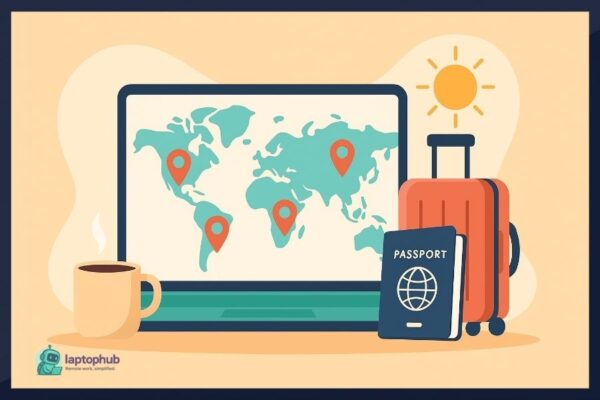Living as a digital nomad can feel like you’ve hacked the system — working from beachside cafes, skipping commutes, and choosing your office view. But while you might be off the corporate grid, the tax authorities haven’t lost track of you. Digital nomad taxes are often complex, messy, and misunderstood. If you’re earning remotely while crossing borders, knowing how to manage your tax responsibilities isn’t optional — it’s essential.
💡Key takeaways:
- Understanding your tax residency is the foundation of managing your global tax responsibilities.
- Utilizing legal tax strategies like the Foreign Earned Income Exclusion and Foreign Tax Credit can significantly reduce your tax burden.
- Choosing the right business structure and keeping precise financial records are key to avoiding costly mistakes.
- Working with a tax professional who specializes in international taxation ensures compliance and optimization of your nomadic finances.
1. Understand Your Tax Residency
Your tax obligations depend heavily on where you’re considered a tax resident. This can be different from your citizenship or where your passport is issued.
What Is Tax Residency?
Tax residency refers to the country (or countries) where you’re legally obligated to pay income taxes. This is typically based on factors like:
- How many days you spend in the country
- Whether you maintain a home there
- Where your main income sources or economic ties are
Country-Specific Examples:
- United States: U.S. citizens and green card holders must file a federal tax return regardless of where they live or work.
- Canada: Tax residency is based on ties such as owning a home or having family in Canada.
- European Union: Most EU countries follow the 183-day rule, but interpretations can vary.
Many digital nomads mistakenly believe that spending less than 183 days in any one country makes them exempt from taxes. That’s often not the case. Always confirm the rules with a tax expert familiar with international and local regulations.
2. Key Tax Concepts Every Digital Nomad Should Know
Foreign Earned Income Exclusion (FEIE)
For Americans abroad, the Foreign Earned Income Exclusion allows you to exclude up to a certain amount of income (over $120,000 for 2024) from U.S. taxation. To qualify, you need to:
- Pass the Physical Presence Test (spend 330 full days outside the U.S. in a 12-month period)
- Or pass the Bona Fide Residence Test (prove you’ve established permanent residency in another country)
This doesn’t exempt you from filing, but it can significantly reduce your tax burden.
Foreign Tax Credit (FTC)
If you pay taxes to another country, you may be eligible for a Foreign Tax Credit, which allows you to subtract foreign taxes from your U.S. tax bill.
Totalization Agreements
These agreements between the U.S. and select countries prevent dual taxation on Social Security-type taxes. If you’re self-employed and working in a country with such an agreement, you may not owe U.S. Social Security taxes.
3. Keep Meticulous Records of Your Location and Expenses
Location tracking isn’t just for Instagram. Your travel dates can affect your tax obligations and eligibility for exclusions like the FEIE. Use location tracking apps such as:
- TaxBird
- ChronoTrack
- Nomad List Passport Tool
Also keep:
- Passport stamps and visas
- Travel itineraries
- Receipts from accommodations and transport
For expenses, categorize everything clearly — flights, co-working fees, client dinners, etc. Use tools like QuickBooks, Xero, or Wave to make tax time easier.
4. Pick the Right Business Structure for Your Lifestyle
Your business structure affects how you pay taxes, qualify for deductions, and manage liabilities. The right choice depends on where you live, your citizenship, and how much you earn.
Sole Proprietorship
- Simple setup
- All income is reported on your personal tax return
- You pay self-employment tax (around 15.3% in the U.S.)
Limited Liability Company (LLC)
- More legal protection
- Flexible taxation: default pass-through or elect S-Corp status
- Requires more paperwork and maintenance
S-Corp (for U.S. citizens)
- Pay yourself a salary and take remaining profits as distributions, which may reduce self-employment tax
- Requires payroll services and more compliance
Foreign Corporation
- If living abroad long-term, this might offer tax advantages
- However, U.S. citizens must comply with strict reporting (e.g., Form 5471)
A qualified accountant can help you weigh these options based on your income, location, and long-term plans.
5. Get Smart About International Banking
Use banking services that simplify international work. Ideally, you want to avoid high fees, currency conversion surprises, and delays in accessing your money.
Popular options include:
- Wise: Multi-currency accounts, low conversion fees
- Revolut: Virtual and physical cards, crypto integration, budgeting tools
- Payoneer: Great for freelancers who get paid via international platforms
- N26 and Monzo: Mobile-first banks available to EU residents
Separate business and personal finances. Use accounting software or apps to keep a clean paper trail. Clients, accountants, and tax authorities all appreciate clarity.
6. Understand VAT, GST, and Digital Sales Tax
If you sell digital goods (like courses, eBooks, or software), you may be liable for sales tax in the buyer’s country.
Countries with Digital Tax Laws:
- European Union: VAT applies regardless of where your business is based
- Australia and New Zealand: GST applies to foreign sellers
- India, Japan, South Korea, and others: Varying digital service taxes
To manage this:
- Use platforms like Quaderno, TaxJar, or Stripe Tax
- Consider using marketplaces that handle VAT for you (e.g., Gumroad, Amazon)
Neglecting sales taxes can lead to large fines. Don’t skip this.
7. U.S. Tax Forms Digital Nomads Must File
If you’re a U.S. citizen or green card holder, here are key forms to know:
- Form 1040: Annual income tax return
- Schedule C: For freelance or self-employment income
- Form 2555: To claim FEIE
- Form 1116: To claim Foreign Tax Credit
- FBAR (FinCEN 114): If your total foreign bank balances exceed $10,000
- FATCA (Form 8938): For foreign financial assets over certain thresholds
Failing to file these forms or submitting incorrect information can result in hefty penalties — even jail time in extreme cases. If you’re unsure, get professional help.
8. Work With a Tax Professional Who Knows International Rules
Not all CPAs understand expat or digital nomad taxes. Find someone with:
- Experience in international tax law
- Familiarity with FEIE, FTC, and FBAR regulations
- Up-to-date knowledge of treaties and reporting obligations
A good tax advisor won’t just file your returns — they’ll help you plan your travels and structure your income to reduce your liability legally.
9. Budget for Retirement, Insurance, and Unexpected Costs
Working independently from abroad means you won’t have employer-sponsored benefits. Take control by planning ahead.
Retirement Options for Nomads:
- Solo 401(k): Ideal for high-income self-employed individuals
- SEP IRA: Simplified Employee Pension, flexible contributions
- Roth IRA: Tax-free withdrawals, though income limits apply
- Offshore pensions: Can be helpful for long-term expats, but come with compliance rules
Also consider:
- International health insurance
- Emergency funds in multiple currencies
- Liability and travel insurance for medical and legal protection
10. Common Mistakes Nomads Make With Taxes
Avoid these costly errors:
- Assuming you don’t need to file taxes because you live abroad
- Failing to track your days and destinations accurately
- Mixing personal and business expenses
- Ignoring VAT or digital sales tax requirements
- Forgetting to report foreign accounts or crypto holdings
- Using the wrong business entity for your earnings
Taxes may seem like a buzzkill, but ignoring them can end your nomadic freedom fast.
Bonus: Crypto and Remote Work
Many digital nomads invest or get paid in cryptocurrency. That’s a tax event in most jurisdictions.
- U.S. law treats crypto as property, meaning capital gains tax applies on sales or trades
- Keep a detailed ledger of transactions (use CoinTracking, Koinly, or TokenTax)
- Declare all wallet addresses and custodial accounts if you exceed reporting thresholds
If you’re earning crypto for services, that’s income — and taxable.
Digital nomad taxes FAQs
Yes, digital nomads still owe taxes based on their tax residency and citizenship. U.S. citizens must file regardless of where they live.
FEIE allows eligible Americans abroad to exclude over $120,000 of foreign-earned income from U.S. taxation.
You can use the Foreign Tax Credit or benefit from tax treaties and totalization agreements between countries.
Crypto is taxable in most jurisdictions. If you get paid or trade crypto, you may owe income or capital gains taxes.
Yes. A tax professional experienced in expat or international tax law is essential for compliance and savings.
Final thoughts
Remote freedom shouldn’t come at the cost of financial chaos. When you understand how digital nomad taxes work, from tax residency rules to reporting crypto income, you unlock more than compliance. You gain clarity, confidence, and long-term sustainability in your location-independent career. Don’t let overlooked tax details jeopardize your dream lifestyle. Get organized, stay compliant, and thrive.
Here’s your checklist:
- Know your tax residency
- Track your days
- Choose the right structure
- Separate your finances
- File required forms
- Get expert advice





